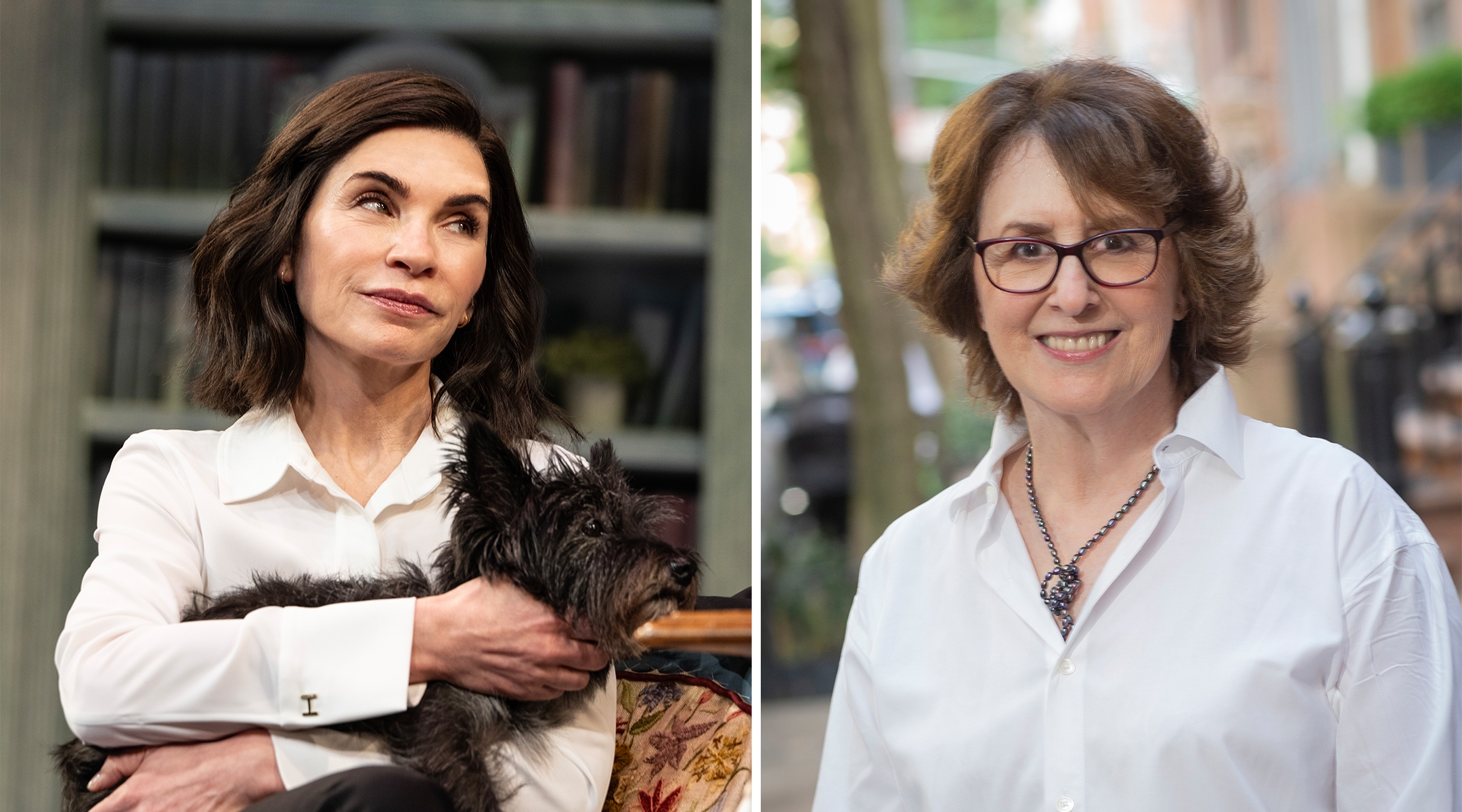A few years ago, two well-known Jewish women serendipitously met walking their dogs in Greenwich Village and immediately connected.
It was a meet-cute befitting a romantic comedy. But this was no movie, nor was it the beginning of a romance.
Instead, this fortuitous encounter between bestselling author Delia Ephron and Emmy Award-winning actress Julianna Margulies led to a bond of sisterhood and artistic collaboration. You might even say their meeting was bashert, Yiddish for “destiny.”
When Margulies, 58, and Ephron, 80, first bumped into each other on that street corner in the Village, they had both recently written memoirs. Margulies, best known for her starring roles on “ER” and “The Good Wife,” had published “Sunshine Girl,” about her unusual childhood and relationship with her parents, in May 2021. Ephron, meanwhile, had completed “Left on Tenth,” about her second chance at love while battling cancer, though it had yet to be published. (That came later, in April 2022.)
Fast forward to the present day, and Margulies appears as Delia in the Broadway adaptation of “Left on Tenth,” now playing at the James Earl Jones Theater (138 West 48th St.). It’s Ephron’s Broadway premiere, and the first time that Margulies has graced a Broadway stage in nearly two decades.
“Left on Tenth” chronicles Ephron’s struggle with acute myeloid leukemia, the same disease that had killed her sister, writer and filmmaker Nora Ephron, in 2012. (Together, the sisters worked on several films that have become cultural touchstones, including “Sleepless in Seattle” and “You’ve Got Mail.”) But it’s not simply a survival story: “Left on Tenth” is also a romantic comedy, about opening oneself up to new possibilities and embracing the silver linings in even the toughest of situations.
“Everything about this play has a miracle quality to me,” Ephron said in a recent Zoom interview, referencing the story of her survival, how her memoir made it to Broadway, and how it gave her the opportunity to work closely with Margulies. “Looking back at my collaborations — and I’ve had some wonderful ones, of course, with my sister — this is as special as any collaboration I’ve ever had.”
In conversation, the two women discussed how Ephron was actively involved in the rehearsal process, and how she still comes to see the play, which opened in late October, several times a week.
Margulies, for her part, said she was thrilled to have Ephron so involved, as “Left on Tenth” was her first time creating a stage role based on a real person. “I would watch how she talked, how she pontificated with her hands, when she was still, and when she was animated,” Margulies said. She captured certain mannerisms of the real Delia Ephron, but in a way that made them her own.
“Julianna kept saying to me, ‘I’m stealing this from you and that from you.’ And I kept watching her performance to see what in the world she was stealing from me,” Ephron said. “People would tell me, ‘She’s just like you,’ and I wouldn’t know what they were talking about. In fact, I became Julianna’s version of me, and it was a relief, because I was scared about her taking me and making me theatrical.”

Peter Gallagher and Julianna Margulies in “Left on Tenth,” now on Broadway. (Joan Marcus)
As the two women talk, the line between Delia, the character portrayed by Margulies, and Ephron, the actual person, becomes a bit blurred. Margulies even goes back and forth between referring to herself in character in the first and third person. But perhaps that’s understandable; in addition to Margulies’ intense study of Ephron’s mannerisms, it turns out the two women share a lot in common.
“We began to find all these little things that overlapped with us,” Ephron said, explaining that in addition to being dog owners who live in Greenwich Village, she and Margulies are the children of writers. They are also left-handed but play sports with their right hand, and they have a similar relationship to their Jewish identity.
“We weren’t into temples, but, I mean, we were Jewish. We knew it,” Ephron said of her upbringing.
Margulies, who currently serves on the board of the Museum of Jewish Heritage in Lower Manhattan, describes her own childhood in virtually the same way. “I wasn’t brought up very religious or Jewish,” she said. “I just knew I was Jewish.”
Both Ephron and Margulies said they find the culture and traditions of Judaism more resonant than the religious aspects. And both grew up with parents who were suspicious of religion in general, equating it with the cause of wars.
A version of that observation actually makes it into the “Left on Tenth” script, when both Delia and her romantic interest, Peter — played by Peter Gallagher and based on Ephron’s real-life husband, Peter Rutter — discuss their own religious identification. “My parents were Jews whose religion was left-wing politics,” Peter tells Delia.
“Just like mine!” she responds.
Ephron is clear that she did not set out to write a specifically Jewish play. “I thought it was a story of a woman who has lost her husband late in life and falls madly in love, to her astonishment,” she said. “But I did not think of it in any way as a Jewish story, except that I am also Jewish.”
Even so, Ephron is aware that her New York Jewish sensibility adds a distinct flavor to the script. “There’s no question about my sense of humor, my parents’ love of books, the fact that I’ve thought about the Holocaust every single day of my life since I was a child,” she said. “I think of my work as having a cultural sensibility.”
The play arguably has a subtle Jewish thread; it’s palpable in the script’s larger themes of hope, endurance and finding joy even in the midst of darkness. It’s also visible in little references to certain words or customs — for instance, Peter steps on a glass at their wedding and describes their romance as “bashert.”
Margulies believes there is a special kind of value in plays like “Left on Tenth,” where elements of Jewish culture are shown in a casual way, without delving into the shtetl life of yore, or religious persecution or antisemitism.
“There’s this misconception that all Jews are with payos and yarmulkes,” Margulies said. “That’s just not the truth. I think that’s where stories like this, that have a little moment that we don’t have to even talk about why, normalizes it a little bit for people. Because you don’t see it often.”
For Margulies, that’s also part of the beauty of Ephron’s script. Just as you don’t have to be over 50 to appreciate the story of a budding romance between two older adults, you don’t have to be Jewish to enjoy the play’s tone and humor. “You take what you need and it’s quite fulfilling because it suits everyone’s needs, from love to sickness to religion,” she said.
The New York Jewish Week brings you the stories behind the headlines, keeping you connected to Jewish life in New York. Help sustain the reporting you trust by donating today.





